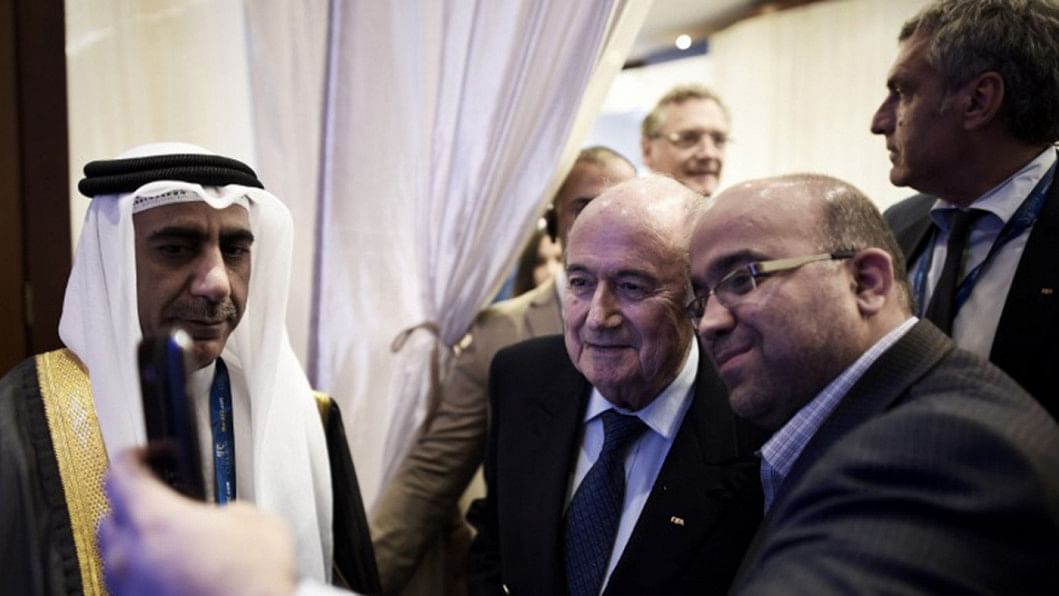Soccer Asia central to picking next FIFA chief

Once a soccer minnow, the Middle East has emerged as one of the sport's most powerful blocs during Sepp Blatter's 17-year reign at FIFA, and is likely to have a big say in who will replace the 79-year-old Swiss.
The Middle East holds power at the 46-member Asian Football Confederation (AFC), the third largest of FIFA's six regional bodies but boasting the biggest and fastest growing population, a dream ticket for FIFA sponsors like Coca-Cola and Adidas.
The region also boasts an abundance of sponsors willing to plough money into the sport, with Qatari finance behind European giants Barcelona and Paris St Germain, while the emergence of BeIn Sports in the TV rights market has helped the money flow in many other leagues.
The power and oil wealth allowing the Middle East to muscle in among the kingmakers at soccer's top table, once monopolised by Europe and South America, helped Qatar surprisingly land the right to host the 2022 World Cup, despite the small Gulf nation's lack of success on the pitch.
The power shift had been evident even before Mohamed Bin Hammam took charge of the AFC in 2002, but it was under the Qatari's watch that the gap widened on traditional Asian powers Japan and South Korea, who lost out on the 2022 World Cup.
"I think it's political skills. Politically, the West Asians were more savvy," said Michelle Chai, a former AFC director who quit after Bin Hammam was kicked out in 2011 for corruption. She now works with the UAE domestic soccer league.
The AFC is now headed by Bahrain's Shaikh Salman bin Ebrahim Al Khalifa, but it is widely accepted that Kuwait's Sheikh Ahmad Fahad Al Ahmad Al Sabah is the key decision maker - and the man candidates will have to convince in return for Asia's support.
A former oil minister, Sheikh Ahmad was recently voted on to FIFA's powerful Executive Committee, adding to his positions as head of the Association of National Olympic Committees and the Olympic Council of Asia.
His support and ability to pool votes is credited with helping Thomas Bach become president of the International Olympic Committee (IOC), Shaikh Salman head the AFC and Blatter win a fifth term in office.
Shifting Sands
Sheikh Ahmad's influence is almost as strong as his father's, Sheikh Fahad, who famously stormed on to the pitch at the 1982 World Cup and successfully demanded the referee disallow a goal for France against Kuwait.
Sheikh Ahmad had been tipped as a potential successor to Blatter - but that was before FIFA's crisis erupted with the arrests of high ranking officials in Zurich last week at the request of U.S. authorities, and Blatter's resignation.
James Dorsey, a senior fellow at Nanyang Technological University's S. Rajaratnam School of International Studies and author of several books on Middle Eastern soccer politics, reckons Sheikh Ahmad's power has been weakened by the recent turmoil at FIFA headquarters.
"Things have flipped. Blatter did a 180-degree turn and that has consequences for the federation, including Asia," Dorsey told Reuters. "Sheikh Ahmad and Salman have been weakened. Those who voted for Blatter because they were afraid can now come out of the dark."
Korea Move
One of those now considering standing for the presidency is former FIFA executive committee member Chung Mong-joon, the billionaire scion of South Korea's Hyundai conglomerate, who helped bring the World Cup to Asia for the first time in 2002.
In an example of the East to West power pivot in Asia, Chung was voted off the FIFA decision-making board in 2011 after losing an election to Prince Ali bin al-Hussein of Jordan, backed then by Sheikh Ahmad.
The Kuwaiti opted against telling his cohorts to support Ali who was running against Blatter in last week's FIFA election.
Dorsey said that has harmed Sheikh Ahmad's popularity.
"There's a lot of bad feeling against Ahmad," he said. "He played a key role from Thursday to Friday in that vote and he had 35 votes that he could play one way or another that would have pushed Ali across the line."
Ali, campaigning on a reform ticket and backed by most of the European Confederation UEFA, has said he is willing to stand again, but it's uncertain if Ahmad would back him or stand himself.
"Ali is a reformer. He is the Middle East, but not the Middle East we are talking about," Dorsey said.
"Ahmad and Salman ... are people from the old regime, people who defended the status quo. Defending the status quo is going to be more difficult."

 For all latest news, follow The Daily Star's Google News channel.
For all latest news, follow The Daily Star's Google News channel. 



Comments